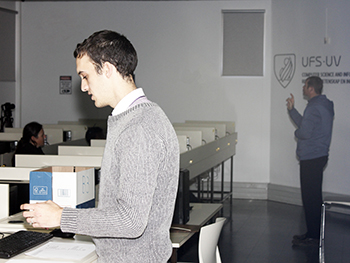Latest News Archive
Please select Category, Year, and then Month to display items
![]()
#UFSupdate (18 March 2020): UFS IMPLEMENTS MEASURES TO MINIMISE RISK OF COVID-19 TO STAFF
STATEMENT BY PROF FRANCIS PETERSEN, RECTOR AND VICE-CHANCELLOR
The executive management of the University of the Free State (UFS) welcomes the announcement of Dr Blade Nzimande, Minister of Higher Education, Science and Technology on 17 March 2020 that all post-school training institutions will have an early recess, starting on 18 March 2020. The Minister’s directive that universities should minimise risk of COVID-19 to all its staff during this time is also welcomed.
The announcement of Dr Nzimande is in line with the university’s decision on 16 March 2020 to suspend the academic programme as from 17 March 2020 and to resume it again on 14 April 2020.
It is important for us all to know that this is not business as usual, and that different thinking is required. Responsible citizenship is one of the crucial elements the world has increasingly been experiencing for the past few weeks. This is why we must act out our responsibility towards one another by focusing on ways in which social distancing can be achieved – especially during this low-risk period that South Africa is still experiencing. This is one of the reasons that informed the university’s decision on 16 March 2020 week to suspend the academic programme and also for students to vacate the residences by 20 March 2020.
The health and well-being of our staff members are equally important. The university’s Employee Task Team that was established on 16 March 2020 analysed options for the continuation of university operations during the recess period. These options were submitted to the executive management, discussed with the Chairperson of the UFS Council and approved on 18 March 2020.
Staff members who have children at school and pre-school may work from home on 19 and 20 March 2020. For the period 23 March 2020 to 13 April 2020, the number of staff members present on all three campuses will be reduced to a minimum and staff members may be allowed to work from home where practically possible.
Arrangements have been made to accommodate those staff members who are performing services which cannot be done from home (such as cleaning, gardening, maintenance, sports, etc) in a flexible and reasonable way. Similar arrangements will be made with office-based support services staff, prioritising institutional needs and based on humane and personal circumstances. Academic staff have been requested to ensure that the online learning materials are finalised and made available for the online learning platform.
The decision for employees to work from home is based on the premise that all employees are deemed to be at work from 23 March 2020 to 13 April 2020. This requires staff members to be available and contactable by line managers at all times during the university’s normal working hours.
I am comfortable that these measures will alleviate the concerns from our staff regarding the spreading of COVID-19 and the risk to themselves without compromising university operations.
Prof F W Petersen
Rector and Vice-Chancellor
University of the Free State
South Campus supplementary schools foster future Kovsies
2016-07-13
The Monyetla Bursary Project, in partnership with the University of the Free State (UFS) and other sponsors, presents an annual Winter School for Grade 12s on the South Campus. In addition, a Saturday school for Grade 12s has been in operation since 2007.
“Champion teachers
in the district
assist learners”
Chris Grobler, a science teacher at Navalsig High School in Bloemfontein, is the organiser of both schools. He says, “I saw it as a tragic state of affairs that those offering bursaries and the bright learners from our formerly disadvantaged schools were not meeting up with each other.”
The first year saw 300 learners attending, with five subjects being presented. This tally has since grown to 650 learners each Saturday, with 11 subjects being presented, including Business Studies, Computer Applications Technology (CAT), Geography, Maths, and English.
“Our vision was to get champion teachers in the district to assist learners to qualify for university bursaries,” says Grobler. The project has succeeded in attracting educators with extensive experience as chief markers or even subject advisors in the Department of Education.

Roald Rautenbach presents the Computer Applications
Technology (CAT) class while Peet Jacobs interprets in SASL.
Video recordings are also made for later distribution.
Photo: Eugene Seegers
Wider reach
“This year, the 1 200 learners at the Winter School hail not only from the Free State but also from as far as North-West, Gauteng, and the Eastern Cape.” Grobler says, “We are very pleased about this, as it means that the image of the UFS is being carried further afield.”
Lesego Modisele, one of the visiting learners from Parys, says, “I like how they brought in teachers that are heads of their subjects, who are very experienced and help us a lot. They explain how exam papers are set and which important things to focus on.”
By means of the Schools Partnership Programme (SPP), 250 learners from Thaba Nchu and Botshabelo have also been assisted. Katleho Setloho, who was one of these students, is currently a medical student at the UFS.
A special feature included in this year’s programme is interpreting services in South African Sign Language (SASL) for Deaf students. As an added bonus, a disc of the sessions in SASL is being compiled for English, Mathematics, and CAT, with plans for it to be distributed to the deaf community in the rest of South Africa via the UFS.